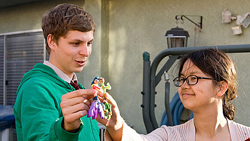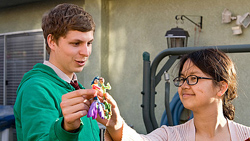Paper Heart, opening in limited release this Friday, is a unique blend of documentary, fiction, and … puppets. Co-writer and star Charlyne Yi (playing herself) travels cross-country with a documentary crew including Jake Johnson (playing real-life director and co-writer Nicholas Jasenovec) interviewing real-life people about their experiences with love. These true love stories are often narrated with hand-made puppets and low-tech effects that capture the genuine charm of these “happy endings.”

Weaving through the interviews (and the puppet interludes), the movie depicts a fictional love story between Yi and Michael Cera (also playing himself), providing the opportunity for the movie to comment on its own themes. The movie asks—and enacts—questions of the romantic comedy narrative, such as: What does it mean to “believe” in love?
Yi, a comedienne best known for her small role in the movie Knocked Up, spoke with CT Movies about why she made a movie about love.
Were you sure love would be funny when you first came up with the idea for this movie?
Charlyne Yi: I don’t think I was trying to be funny. I [thought] if there was humor, it would come from within the genuineness of the story. So I don’t think it was ever a concern. I was just excited to make a movie that would hopefully capture true-love stories and hopefully wouldn’t be too depressing.
Did you draw on your own experience with love in writing the screenplay for Paper Heart?
Yi: The screenplay was an outline of five pages, so there was much brought from the actors improvising. Nick and I wrote the outline, but it was very, very simple. It was more of a beat sheet of where the story was going. The only inspiration was that we wanted to make this as hopeful as possible, without any dramatic turns—like a third party, jealousy, or a love triangle. We just wanted everything to feel a bit mundane; even their conversations are about food and not necessarily about anything exciting. We were just trying to make it feel grounded and trying to match the tone of the documentary pieces so they wouldn’t be so jarring.

Is everybody’s definition of love different, or do you think there is some “true” form of love that everybody’s experiencing differently?
Yi: I think it’s different for everyone. Not to sound like a hippie, but everyone’s right.
Did you think that any of the definitions or experiences with love that you saw in your interviews worked better than others?
Yi: One of my favorite things that a couple said—it’s very brief in the film, it’s actually during a montage of things people say—[was] a couple called Dan and Mary, who say something like, “Love is really worth fighting for, and no one could ever replace those memories or that person. It’s worth it in the end.”
It was really nice to hear that, because sometimes I’ll meet married couples one-on-one who say, “Don’t get married.” But Dan and Mary seemed so genuine in the fact that they’re willing to fight, and even though there are hard times, it’s worth it in the end. It kind of reminds me of the ending of Eternal Sunshine [of the Spotless Mind], where you know what you’re going to go through hardships, but it’s definitely worth the memories, even if you’re going to get hurt.
If viewers were to walk away from this movie learning any sort of “lesson,” what do hope it would be?
Yi: Live each moment, enjoy it while it lasts, see where it goes. You can’t learn through other people, you have to learn from your own experience. But talking to other people can help.
Alicia Cohn is a Christianity Today intern and Wheaton College graduate, grew up watching movies nightly with her family, and dresses up for midnight premieres>.
Copyright © 2009 Christianity Today. Click for reprint information.










